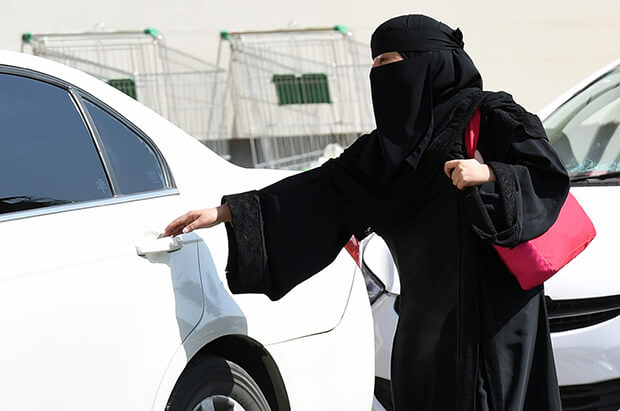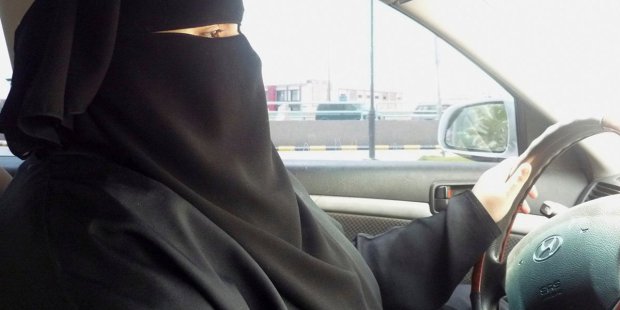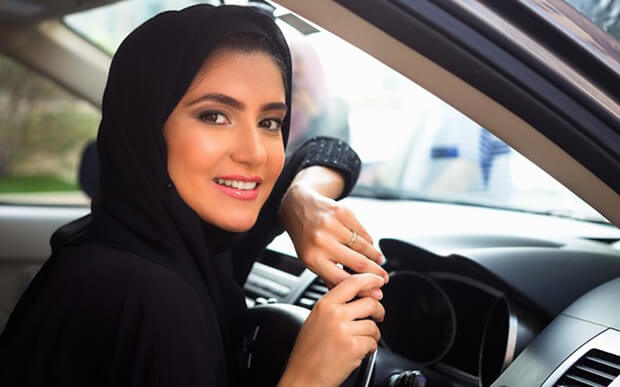A huge step forward for women's rights in Saudi Arabia as women will now be allowed to drive

A royal decree has been announced in the Kingdom of Saudi Arabia overturning a ban on women holding driving licences and being allowed to drive.
This is a huge turning point in the highly conservative Islamic kingdom. Saudi Arabian women have hailed the move by the conservative kingdom’s ruler to allow them to drive as a landmark moment in the country’s modern history.
Saudi Arabia is a society where gender roles have long been rigidly demarcated and strictly enforced. The women of the Kingdom have responded with jubilation to the laws which activists and senior Saudi officials claim marks a watershed in the country.
Saudia Arabian Subjects React to News that Women Can Now Drive
Sultana al-Saud, 26, from Riyadh said:
“The mindset has shifted. We weren’t waiting for our families to accept, we were waiting for something larger to back us up, a backbone, which is the government.
‘I felt like one of my father’s songbirds, let out of its cage’: driving as a woman in Saudi Arabia
“This is a huge step for women, it’s nice to see women behind the wheel metaphorically I believe it’s like her leading her life now. The patriarchy is slowly but surely turning to land of equality. This is amazing. It’s the first few steps of freedom, we didn’t even reach 2030 yet,”
We are part of this big vision. We women are now taken into consideration.”
Women can now legally obtain a driving licence without asking a male guardian's permission, as “guardianship” laws have traditionally granted Saudi men power over female relatives.
Less than a day after the royal decree was issued, Saudi women said the shock was still being absorbed across the kingdom, where societal rules are often governed by an inflexible reading of Islamic teachings.
Senior Saudi clerics appeared to be onside, responding with an apparently coordinated series of public statements, aimed at shifting a widely expected conservative pushback. A commission of top Islamic clerics tweeted:
“May God bless the king who looks out for the interest of his people and his country in accordance with sharia law.”
Dr Abdel-Latif al Sheikh, the former head of the religious police, tweeted:
“Women driving is not against sharia and women will choose what best suits them.”
Sheikh Khaled al Mosleh, a professor of religion in Saudi Arabia, also tweeted that
“allowing women to drive answered the needs of a big portion of the population”.
“There’s still a lot of rumours going on. Sharia law can still play a large role in this. There are rumours about women not being able to drive (in parts of) Saudi, that you have to be above a certain age, that there might be a curfew.”
Sana Kayali, 21, a university student in the Saudi capital, said:
“This is a very good beginning. Who would’ve thought we are starting to become modern. I believe change will take place gradually.”
Amal al Dayyem, 23, another university student in Riyadh, described the announcement as “real beginning”.
“Most families will be on board with this simply because people no longer want to spend a huge chunk of their salaries on drivers and transportation. We can do this on our own,”
“Women all over the Gulf can drive, it was about time we Saudi women get the right to as well. Society will be accepting once they see how easier matters and everyday chores will be once this is implemented.”
Madawi al Blehid, 36, a personal trainer, said:
“This is something huge for us, women and girls. It’s not just about driving per se, this is about the fact that it is now our right and we have the freedom of choice. We’re no longer under the mercy of drivers and siblings.
“The fact that we need approval of family and society is normal. This is the first time so … we can’t just explode on the scene it will cause a lot of problems. Even in taking it slowly, there will be problems but we should be able to overcome. Women are overjoyed. We woke up happy.”
Maysoon Sleiman, 55, a doctor from Riyadh, said:
“The thing is, a house cannot function properly without a driver and a lot of families cannot afford to hire one.
“This has nothing to do with religion, it’s our customs. Which is why I expect backlash and disapproval from a lot of women not just men. A long time ago, they used to shoot at satellite dishes because they were dubbed haram [forbidden], now they sell them. It’s going to be the same in this I believe. At least mothers can now safely drop their kids to school.”

What Saudi women can do:
- They can vote in local elections – Women first cast ballots during municipal election in 2015
- They are also allowed to campaign for public office
- Be appointed to the Consultative Council – At least 17 women were elected during the 2015 municipal vote.
- Go to university
- Play sports and compete in the Olympics
What Saudi women cannot do:
- Marry or divorce without permission from their male guardians
- Travel, open a bank account, get a job, or have surgery without permission from their male guardians
- Interact with men Dress the way they want – they must wear a full-length black abaya covering their modesty.
- Set up their own business without a male sponsor
- Keep custody of their children in a divorce after they reach the age of seven for boys and nine for girls
- Apply for a passport without the permission of a male guardian.
- Eat at restaurants that don’t have a separate designated family area
- Use the main entrance of a restaurant (usefully reserved for men)
- Have an equal and fair hearing in court – in Saudi Arabia, the ‘testimony of one man equals that of two women’
- Receive an equal inheritance – under Sharia law, daughters only receive half of what is awarded to their brothers.

(As always, if you or a family member are considering buying a used car, don’t buy until you run a car check report with MyVehicle.ie where you will find out the true history of the vehicle.)

Author

Justin Kavanagh
Justin Kavanagh is a recognised leader
in automotive intelligence and vehicle
data supply to the entire motor industry.
He has almost 20 years experience in
building systems from the ground up.
As the Managing Director of Vehicle
Management System, he understands the
need and importance of trustworthy and
reliable vehicle history and advice to
both the trade and the public.
Follow me on LinkedIn